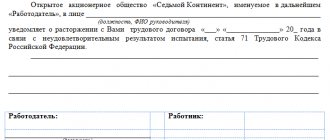In what cases can you not work for 2 weeks upon dismissal? Many are sure that there is no way, and do not even ask themselves the question: “Do I have the right to early care, and how can I avoid working out?” Even some labor law experts are confident that it is impossible to avoid working off the job upon dismissal at will. However, in fact, this is not entirely true. Let's figure out whether it is necessary to work out in each case, or whether you can do without the two-week period.
“Workout” or notice of dismissal
An employee often asks the question: “Can I be fired early?”
And it’s true: the need to work off upon dismissal is established by the Labor Code. Article 80 of this regulatory act determines that 14 days is the time that must pass between the submission of an application and the official termination of the employment contract. However, even the Labor Code of the Russian Federation in the same article establishes that two weeks of work can be reduced by agreement between the employee and the head of the enterprise. Only an extension of time is prohibited: if after the expiration of the period the worker continues to work, he has the right to consider that the contract has not been terminated. In this case, work can continue and the dismissal will be cancelled. Moreover, any “working off” is prohibited after the contract is terminated: termination of the contract means that the employee’s relationship with the enterprise is severed, and he no longer owes anything to the previous employer.
In what cases is dismissal without work service legal under the Labor Code of the Russian Federation?
First, let's look at what the Labor Code of the Russian Federation says about this. It directly provides for several cases (Article 80 of the Labor Code of the Russian Federation) when it is possible to quit without working off.
Dismissal by agreement of the parties
You have been looking for a job for a very long time and finally another employer offered you the coveted position. But the new employer urgently needs an employee and he offers you to leave on Monday, and the calendar says Wednesday. What to do in this situation? Approach your current employer and explain the situation. Perhaps he will agree to let you go without detention. According to paragraph 2 of Article 80 of the Labor Code of the Russian Federation, with the consent of both parties, it is possible to terminate the employment relationship earlier (before the expiration of the notice of dismissal).
Inability to continue working
Paragraph 3 of Art. 80 of the Labor Code of the Russian Federation allows you to quit without working off if you do not have the opportunity to continue working. The reasons may vary. The Labor Code of the Russian Federation contains an open list of them, and only 2 are indicated as an example: admission to an educational institution and retirement upon reaching retirement age. Another reason may be the spouse’s relocation for work reasons (resolution of the plenum of the Supreme Court of the Russian Federation dated March 17, 2004 No. 2).
Find out from ConsultantPlus whether dismissal due to relocation is a reason for dismissal without service. To get everything done correctly, get trial access to the system and go to the Ready Solution.
About the nuances of registering the dismissal of an employee in connection with his retirement, read the article “Dismissal of an employee in connection with retirement (nuances)” .
Violation of labor legislation by the employer
This clause contains the same paragraph 3 of Article 80 of the Labor Code of the Russian Federation; if the employer violates the norms of labor legislation (including those provided for by internal regulations), then you have the right to leave without 2 weeks of work.
Separately, the legislation considers the case when an employer delays the payment of wages to its employees for more than 15 days (Article 142 of the Labor Code of the Russian Federation). In such a situation, the Labor Code of the Russian Federation gives the employee the right to suspend the performance of his official duties. And along with the application for suspension of work, submit a letter of resignation. If the suspension of work lasts more than 14 calendar days, then there is no need to work off, since the days of suspended work are considered to have actually been worked.
You can also avoid working time if you go on vacation or sick leave before leaving. If the vacation lasts more than 2 weeks, then the date of dismissal will be the last day of vacation. And if an employee is sick longer than this period, then he must be fired on the 14th day.
The article “How to correctly arrange leave with subsequent dismissal ” will help you understand the peculiarities of registering leave with subsequent dismissal .
In addition to those listed above, there are several other opportunities to avoid two weeks of work upon dismissal. They are not directly provided for by law, but have become practically normative due to the frequency of their use in practice. For example, care for health reasons, when changing place of residence, due to the need to care for a child or a sick relative. All of them are applicable only with the consent of the employer.
IMPORTANT! In the resignation letter, the employee must clearly state his request to be dismissed without work, indicate the reason and the specific date of departure.
Negotiate on good terms

The Labor Code of the Russian Federation gives such a right, and, if desired, dismissal without service can become a reality. In addition, you can do without working out after dismissal (more precisely, after filing an application) if, instead of termination “on your own” (according to Article 80 of the Labor Code of the Russian Federation), dismissal by agreement is formalized (Article 78 of the Labor Code of the Russian Federation). In this case, the parties, that is, the employee and the employer, can agree on any conditions of dismissal - including whether it is necessary to work for two weeks. Typically, dismissal by agreement implies that termination of the contract occurs exactly on the day chosen by the parties, and the employee has the right not to work for any period after agreement is reached.
Which article of the Labor Code of the Russian Federation regulates working out 2 weeks upon dismissal in 2021 - 2021
Probably every working person knows about such a stage of dismissal as working off.
It is worth noting that the concept of working off is not given in the legislation. It is often confused with the employer’s warning period about upcoming dismissal. Following Art. 80 of the Labor Code of the Russian Federation, an employee is obliged to inform the employer in writing about his decision to leave 14 calendar days before the date of dismissal. But the Labor Code of the Russian Federation does not indicate that an employee is required to work on these days. Having decided to change jobs, a person may wonder: is it possible to leave without working? The answer to this can be found in Art. 80 of the Labor Code, as well as the established practice of personnel officers and courts.
ConsultantPlus experts spoke in detail about the procedure for working out upon dismissal of one's own free will. Get trial access to the K+ system and upgrade to the Ready Solution for free.
Special cases of dismissal
In addition, there are certain situations when the head of an enterprise is obliged to let an employee go without working for 2 weeks. And the first of them is dismissal under a fixed-term contract. If the employment contract was initially concluded for a certain period or season, then in this case it is terminated on the last day, and there can be no talk of any “work after dismissal”. If such an employee wishes to resign early, he only needs to work for 3 days.
In addition, the legislation specifically provides for some situations in which an employee can do without the question: “Do I have to work for a two-week period if I don’t want to?” Here is a list of cases when it is not necessary to work 2 weeks upon dismissal:
- Dismissal occurs due to the fact that the employee is unable to continue working and is required to resign on a specific desired date. For example, he retires, is enrolled in a university, is drafted into the army, etc.
- Dismissal is due to the fact that there is a serious violation of the law, and because of this, the head of the enterprise or entrepreneur will have to release the employee at a specified time. Violations include significant delays in payment of wages, an unequipped place to work, etc.
- If the person is on probation. Here you do not need to work the usual term - as with urgent or seasonal work, only three days are enough.
- So-called personal circumstances. We should talk about them in more detail.
Results
To summarize, we can conclude that dismissal without working for two weeks is quite possible. Working out upon voluntary dismissal is not always a mandatory procedure, and its duration may vary. Of course, if the employee was unable to avoid working time and is at work, he must comply with all the terms of the employment contract. Otherwise, the employer has the right to fire him for absenteeism or failure to fulfill job duties.
In any situation, the best solution would be to agree on all the details of dismissal with the employer, who often accommodate employees halfway.
This will avoid possible difficulties and disputes during care. You can find more complete information on the topic in ConsultantPlus. Free trial access to the system for 2 days.
Situations in your personal life that contribute to early dismissal

In what cases can an employee not work for 2 weeks if dismissed due to life circumstances? The Labor Code does not provide a complete list of situations, however, in practice, the following circumstances are usually encountered, which any court (if it comes to the case) recognizes as valid:
- The need to move after the wife (husband) to another area. For example, a long business trip of a spouse, when the whole family leaves after him, is usually considered as a case when it is possible to do without working time.
- Deterioration of health when it is necessary to leave a specific area. For example, an employee with a serious lung disease cannot work in the Far North, where any cold can lead to pneumonia. Here you only need to take a medical certificate confirming the need to move.
- Presence of minor children. If there is a child (and especially a disabled child) who requires care, the employee may qualify for early dismissal and not work for 2 weeks upon dismissal.
- Also, an employee is not required to work 2 weeks if caring for an adult but sick family member is required (for example, a disabled husband, wife, mother or father).
- If a pregnant woman quits, she cannot be forced to work for 2 weeks. However, you need to remember: when a pregnant woman quits, she loses all compensation and benefits provided for under labor law.
Vacation and sick leave
If you want to quit, but don’t have the slightest desire to work for 2 weeks, the employee should pay attention to the following: the law requires a two-week period to be observed - but there is no need to be present at work during this time. The resigning person has the right to take these 2 weeks as vacation credit - and then he will be fired on the last day of his vacation.
The same applies to illnesses: if you don’t want to work and have some kind of illness, then, having received sick leave for two weeks, you can immediately submit an application on your own. Then, by the time the sick leave period ends, you can receive a work book and a final payment.
Who has the right not to work for 2 weeks?
The need for two-week work is reflected in Article No. 80 of the Labor Code of Russia. Also, the specifics of dismissal are given in Articles No. 77, 78 of this legislative act.
The employee is obliged to notify the employer of the decision to terminate the employment contract with him two weeks before the planned date of departure. Within 14 calendar days after signing the application, the person is still on the company’s staff.

A similar dismissal procedure was developed for the following purposes:
- so that a person who is planning to quit can think about his decision, be reinstated in his position or prepare for further work in another workplace;
- so that the employer can find another candidate for the vacant position;
- so that the HR department can prepare all the documents, issue a work book and make financial settlements with the employee who is leaving.
In some cases, a person may be exempt from visiting the workplace for two weeks after filing an application for termination of employment.
The following categories of persons have the right to early termination of an employment contract:

- applicants from educational institutions (must provide a certificate of admission to the university);
- people of retirement age;
- disabled people.
A company whose manager violates the Labor Code of the Russian Federation and other regulations and exceeds his authority is obligated to terminate an employment contract with an employee at a time convenient for him.
A person who plans to quit without working for 2 weeks should focus his application on the poor equipment of the workplace, non-compliance with the deadlines for payment of vacation pay and wages. If, after filing such an application, the employee’s request is ignored by the head of the company, then the employee has the right to appeal to the judicial authorities.
According to the Labor Code of Russia, the following categories of employees can resign within three days from the date of filing the application:
- company employees who are on a probationary period;
- specialists with whom the company has entered into a temporary contract, a seasonal contract for 2 months.
You can also quit without working in the following cases:
- the need to care for an incapacitated person;
- relocation of one of the spouses for a long time to another city or country;
- a significant deterioration in the employee’s health, due to which he loses the ability to perform his job duties;
- presence of children under 14 years of age;
- presence of 2-3 children under 16 years of age;
- pregnancy.
All circumstances that make it impossible for an employee to perform his duties must be set out in the resignation letter and supported by documents.
How to overcome bosses' objections

But what if, even under these circumstances, they force you to work or even refuse to fire you? Let's figure out how to achieve your goal, and whether it is possible to get fired if management objects. If an employee has valid grounds for dismissal, but they refuse to let him go, he must submit an application:
- To the Rostrud inspectorate at the location of the organization. Usually this is enough.
- To the prosecutor's office. This government body monitors compliance with any legislation, including labor legislation.
- To court. However, it must be remembered that due to the workload of the courts, any application there will be accepted for consideration at least after 3-4 weeks. In any case, this is longer than the working period, so it makes sense to go there only if there is a significant violation of the law on the part of the employer and compensation needs to be recovered.
Who can't count on two weeks
It should be noted that for some employees, labor legislation establishes special obligations. In particular, they exist for:
- heads of enterprises or organizations;
- coaches and athletes, except those whose contract is valid for less than 4 months.
These workers have to comply with a notice period of 1 month.
In addition, you need to remember that labor legislation provides special rules for workers who work not in organizations, but for citizens. For them, the notice period can be either increased or decreased - the parties themselves decide what to write in the employment contract.
What absolutely should not be done
Sometimes an employee thinks like this: “I don’t want to work, so maybe I should quit under the article?” Indeed, if an employee has committed or committed a serious violation of duties, he will be fired immediately. It would seem simpler: I didn’t show up for work and the next day I was fired.
However, this method cannot be used. A note of dismissal is placed in the work book - and therefore it will be much more difficult for an employee dismissed due to a violation to find a job again.








